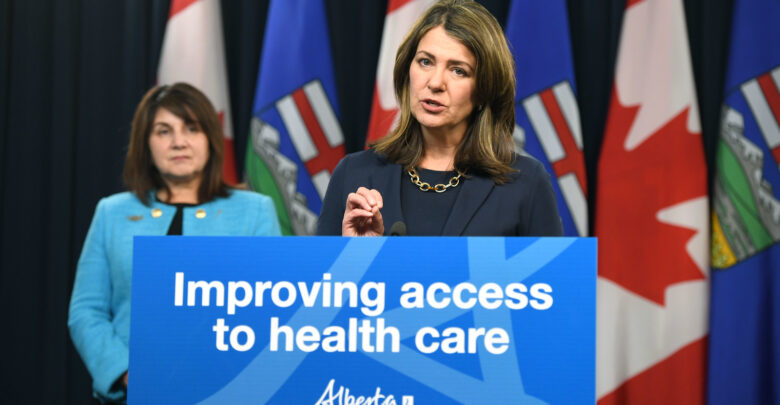A controversial new plan to shift Alberta hospitals away from AHS
Transferring hospitals to Covenant Health won't improve care, it'll make it harder for women, Indigenous, and 2SLGBTQIA+ folks to access care.
 Supplied
SuppliedThe race to fix health care continues and Alberta Premier Danielle Smith has announced a radical new plan for hospitals. However, her plan might just lead to a different set of problems. On August 17 at a private town hall event, Smith discussed the idea of moving some of the province’s hospitals away from the management of Alberta Health Services (AHS).
AHS is the province’s largest health care provider and manages the majority of our hospitals. Covenant Health is the only other health care provider in Alberta that’s equipped to manage hospitals. Both providers receive public funding through Alberta Health, but Covenant Health is affiliated with the Catholic Church. This could significantly affect people’s ability or willingness to receive care in their facilities, especially for women, the 2SLGBTQIA+ community, and Indigenous people.
For one, shifting hospital management to Covenant Health could negatively affect many Albertans’ ability to seek reproductive care. Covenant Health’s Ethics Guide calls for restricted access to IVF, emergency contraceptives, and abortion. These restrictions are due to the provider’s affiliation with the Catholic Church.
Access to reproductive health care is necessary for family and economic planning, and overall well-being. For undergraduate students, accessible emergency contraception is particularly important. Few students plan for children during undergrad and with the rising cost of tuition even fewer can afford to.
Abortion is medical care. And Covenant Health’s restriction of abortion doesn’t align with the World Health Organisation’s (WHO) guidelines. According to WHO, “lack of access to safe, timely, affordable and respectful abortion care poses a risk to not only the physical, but also the mental and social well-being of women and girls.” Ever since the fall of Roe v. Wade in the United States (U.S.) we’re seeing time after time how lack of abortion access can lead to avoidable and tragic situations.
Assessing the potential risks of hospital management under a religiously affiliated provider is important. Especially given that Covenant Health is currently the only alternative to AHS that Smith has mentioned. Hospitals exist to serve a diverse population. Not everyone is going to be comfortable with receiving medical care from Covenant Health.
Conversion therapy is any treatment or sustained effort to repress, deny, or change a person’s non-heterosexual orientation or non-cisgender identity. The Canadian Mental Health Association (CMHA) has stated the practice is harmful to the 2SLGBTQIA+ community and ethically condemns it.
Per its Health Ethics Guide, Covenant Health doesn’t provide those experiencing gender dysphoria with access to gender affirming care. This includes hormone replacement therapy and referrals for gender affirming surgeries. Instead, it outlines that those seeking gender affirming care shall receive “psychological and spiritual support needed to try to achieve integration in their being.” While this is not explicitly conversion therapy, the ethics guide seems to suggest denying an individual’s gender identity if it doesn’t align with their assigned sex. Transferring hospital management to Covenant Health could severely impact transgender people’s access to appropriate health care.
Additionally, Indigenous people may be hesitant to seek care from Covenant Health. Indigenous peoples have faced horrors through the residential school system, which was largely run by the Roman Catholic Church. It’s worth noting that Covenant Health has an Indigenous Advisory Committee which aims for reconciliation. While this is an admirable step, it’s understandable if survivors and their families are uncomfortable seeking treatment from Covenant Health. Accessible secular health care providers are necessary across Alberta as we continue reconciliation efforts with Indigenous peoples.
Health care access will be particularly difficult for rural Albertans who require care that doesn’t comply with Covenant Health’s ethical guidelines. Smith specified transferring operations of rural hospitals that are struggling to Covenant Health. There will likely still be hospitals under AHS to choose from within major cities. However, rural Albertans often do not have multiple hospitals in their area. If a community’s only hospital is transferred to Covenant Health’s control, they won’t have other options to choose from.
Is shifting hospitals away from AHS a solution to the health care crisis? It may do more harm than good. With Covenant Health as the only alternative there is a major risk to accessible reproductive care and secular health care options. Without question, our health care system has issues that the provincial government needs to address. AHS has suffered from pressures to cut costs, personnel shortages, and insufficient infrastructure for years. Instead of taking responsibilities away from AHS altogether, the Smith and the United Conservative Party (UCP) should work to actually address these issues. Transferring power to Covenant Health only presents more problems for Albertans.




